- Home
- Anna Kavan
Let Me Alone Page 23
Let Me Alone Read online
Page 23
They were going back to Matthew’s old district. He put on his hat and leaned out of the window expectantly. There was a station and a hideous water-tank in the midst of the plain that flowed up to the feet of the hills like a lake. The train stopped. This was their destination.
Anna stood at the carriage door, looking out at the inevitable station crowd of lively, high-coloured figures. It was late afternoon. Matthew was expecting to be met by Jonsen, the man he was to relieve, but Jonsen was not visible. So Matthew stepped down among the crowd and went to look for him, leaving Anna to wait. The people stared at her and made remarks in their quick, gulping, guttural language which seemed to be all monosyllables. She rather liked the look of them; their clear, round, moonish faces, their good-natured, slightly cheeky appearance. Back came Matthew, looking annoyed, and followed by two men, natives of India, with much darker, almost purple skins, and large metal badges worn on a sort of sash over one shoulder.
‘Here are the chuprassies, but Jonsen hasn’t turned up,’ said Matthew. ‘It’s really too bad of him.’ He scowled in his irritable, ineffectual style. Things were going wrong, as usual. The inevitable hitch had occurred.
Anna got down on to the platform. The chuprassies climbed into the carriage and fetched out the luggage. The train went on. Matthew and Anna went out to the back of the station, the chuprassies pushing a way for them with the hand-luggage through the crowd. Here was a nondescript space of trampled ground, with people waiting, and a row of bullock-carts. The luggage was deposited in a pile on the dusty earth. Off went Matthew, and disappeared once more, leaving Anna beside the luggage. She waited, feeling abandoned. The bullocks rolled great eyes of apprehension at her.
At last Matthew returned, accompanied by a fairish, rather heavily-built, vaguely Teutonic type of man, wearing khaki and a battered pith helmet. This was Jonsen. He was introduced to Anna.
‘I’m sorry I wasn’t in time to meet your train,’ he said. ‘I thought I had allowed ample time, but my watch must be slow.’
He seemed to look at Anna with astonishment. She could feel that he thought her an extraordinary person to come to Naunggyi. And she herself felt distinctly out of the picture in her smart dress of yellow shantung. But she climbed into the back of the old Ford car, and sat on the dirty cushion with her dressing-bag at her side. Matthew got up in front, beside Jonsen, who was at the wheel. There they sat in front of her, the two men, turning the backs of their necks, and the bulky breadth of their shoulders towards her, and taking no more notice of her than of the man in the moon.
The sun was slanting down to the tops of the hills, gold auras of dust encircled the moving carts as the rays caught them. The Ford ran busily over the narrow road, which was banked up several feet above the marshy level. Along the road, brown men in skirts, women in skirts with short white bodices, walked in the pale dust, carrying baskets or bundles, or leading children by the hand. Most of the women had flowers tucked behind their ears, something like the pictures of Carmen, with their sleek black hair. And they all moved along with an easy, childish grace, swaying a little from the hips, whilst their bare feet, or their coloured heelless slippers, ruffled the soft dust.
On went the car, over the marshy plain; the station was left well behind. Occasionally they had to pull out to the very edge of the road, hanging almost over the embankment, while neat, mouse-grey bullocks tripped past, drawing a two-wheeled cart. They were going towards the hills. Looking ahead Anna could see the blue ridge of hills about ten miles away, and nearer, a darkness of large trees, with buildings showing between, where the village was.
She looked at the two heads, bobbing so foolishly before her in their clumsy hats. And the two necks: Matthew’s, hard and leathery-smooth and somewhat skinny, but with a tough, almost rubber-like turgidity, like the stem of some forceful plant; and Jonsen’s, flaccid and red and deeply creased and rather unappetising. She didn’t like the look of them at all, those necks. But somehow they fascinated her even more than the novel landscape.
A few houses came in sight. This was the place towards which they had been travelling for more than a month. They had arrived. The Ford rattled in between two wooden gate-posts, and up to a dark wooden house, the ultimate goal of the journey. Servants appeared and took the hand-luggage. Anna got out. There she stood, on the hot, caked, dusty earth in front of the house. The building rose on a little hillock. A bare, brownish stretch of ground went down to the road, with a solitary palm, very tall and dilapidated, with an air of having run to seed, in the middle. Enormous trees, neither quite in nor quite out of leaf, grew on the left, with some flowering bushes. On the right, where the ground fell away, was the edge of the marsh. And there were blue little flowers, very vivid. The sun had just set, the sky was empty.
Matthew was talking to Jonsen at the foot of the steps.
‘You will leave us all your furniture, then,’ he said. ‘We will take on the house just as we find it.’ It seemed to be the end of a discussion.
They went up the steps and into a bare hall with a flight of bare wooden stairs rising. On each side, left and right, was a tattered bead curtain indicating a doorway. There were no doors except the outer door through which they had just entered. Jonsen led the way into the left-hand room. This was the drawing-room. It was a fair-sized apartment with a stone floor: white walls with a kind of shelf of brown wood running round, and wooden-shuttered windows, rather small, and glassless: a little cheap cane furniture: a huge punkah made of some brownish fibre hanging motionless in the middle of everything. It was rather like a room in some poverty-stricken hospital, doleful and bare, without carpets or curtains or ornaments of any kind.
‘Would you like some tea?’ said Jonsen, doubtfully, to Anna.
‘Yes please,’ said she, rather dazed. It was all unreal and astonishing to her. Outside the window she could see the gleaming, darkening sky. And a cluster of strange long leaves, long and pointed, like a handful of drooping swords, brilliant lemon colour. She felt she was lost, utterly lost. She had travelled away from the normal world, the world of Oxford and Blue Hills, and come to this other strange, strange place, this world of unreality.
Matthew stood beside Anna, smiling. He had taken off his hat and seemed quite at home already.
‘What do you think of it?’ he asked her.
Which, in her present state of astonished bewilderment, was the last thing she could have told him. But he did not wait for an answer. He smiled complacently.
‘It’s quite a good bungalow,’ he said.
Anna examined the room. There was a cane lounge in front of the window, jutting stiffly into the room. Near the door was a wooden table with scattered papers, an ink-bottle, pipes and a tin of tobacco. Round the walls ran the narrow shelf upon which various small articles – tools, cartridges, magazines – had been allowed to accumulate. There were also two cane arm-chairs, a small cane table, two wooden chairs, and an ugly china vase pushed into a corner. And there was the punkah.
A servant came in with a tray.
‘I’m afraid you will find my arrangements rather primitive,’ said Jonsen. ‘The crockery has nearly all been broken. I have lived here alone for so long.’
He set one of the cane chairs for Anna. It looked dusty and the seat was broken, there were sharp ends of cane sticking up. She was afraid of spoiling her dress. But she sat down and poured herself a cup of tea from the hideous enamel teapot. Her cup was chipped and ugly. The men sat facing her with their whiskies and sodas. They would not drink tea. A tin of biscuits was on the table. Anna took one, but it tasted musty and rather unpleasant. There was nothing else to eat. Matthew seemed quite at home.
‘It’s good to be back,’ he said.
She looked at him with grey, astonished, doubtful eyes. She did not know what to think.
‘Don’t you like it?’ he asked, smiling.
‘It seems very extraordinary,’ she said. She really could not think of any other comment.
Jonsen continued to lo
ok her up and down with surreptitious amazement. He had small, twinkling eyes in a puffy, reddish face, and was a man of about fifty – but with a simple, almost childish expression. The good-humoured simplicity seemed a little deceptive, though. There was a suspicion of malice somewhere about him.
‘I expect you will find it strange at first,’ he said to Anna. ‘When you get used to the life you will like it.’
But she felt sure he was thinking she would not like it, and was taking a malicious pleasure in the prospect of her discomfiture.
Matthew began to ask questions about the work. The two men drew their chairs to the table and embarked on a technical conversation, making notes on the backs of crumpled papers. Anna was left alone with the dregs of her tea. She sat motionless, thoughtless, feeling dazed. The room grew darker.
Presently a servant brought in a lamp. It was an old-fashioned oil-lamp with an ugly, white, mushroom-shaped shade. He placed it on the table beside Matthew’s arm. The boring drone of conversation went on. Crowds of insects began to circle round the lamp, the table was soon strewn with an irregular circle of singed corpses. No one took any notice of Anna.
At last Matthew pushed back his chair.
‘We’ve been neglecting you,’ he said, smirking at her with his curious imitation gallantry that took no heed of her at all, really.
‘It doesn’t matter,’ she said stiffly.
‘There is so much to discuss,’ said Jonsen, apologetic. ‘And so little time before I leave.’
She could feel the prick of malice underneath his apology. He resented her youth, her assurance, her attractiveness. He was glad that she should be neglected. He wanted her to be taken down a peg. Anna eyed him distastefully.
‘Shall we go along to the club?’ said Jonsen. ‘It’s getting rather late.’ He gathered the papers into an untidy pile, and stood up. Matthew, too, seemed ready to make a move.
‘I had better go upstairs and tidy myself,’ said Anna.
‘You’re quite all right as you are,’ said Matthew. ‘Quite smart enough for Naunggyi.’
Which she felt was even more than the truth. She shivered a little. She went towards the doorway.
‘I should like to go upstairs, all the same,’ she said, coldly asserting herself against the two males.
So up they all clattered, up the bare wooden stairs to the floor above.
The upper floor of the house was simply divided into three large rooms – the middle one, into which the stairs directly led, and one opening out of it on each side. Here also was an absence of doors. Instead, there were in the middle of each doorway two small wooden panels, like flaps, arranged with some sort of a spring, to spring back into place after one had pushed through. Above and below the flaps was a foot or two of vacancy. Anna looked at this arrangement in amazement.
‘Why are there no doors?’ she asked, rather dismayed.
‘Too hot,’ said Jonsen laconically. His small eyes twinkled in the lamplight. Matthew looked on, smiling blankly.
Anna took the lamp and went away from them, into the room which would be hers. It was a biggish room with a wooden floor and whitewashed walls and long windows opening on to a little veranda. There was a tall cupboard in one corner and a brown wooden bed under a mosquito-net in the middle of the room – a single bed she was glad to see. The white mosquito-net was turned up to form a sort of canopy over the wooden poles, giving the bed an incongruous old-world look. The bathroom was a separate closet-place at the end.
It was not such a bad room – barn-like and bare, to be sure: but it had possibilities. With curtains and so on, it could be made habitable. But no privacy, not the least in the world. Anna looked askance at the spring-flaps of doors.
She unlocked her dressing-bag and took out soap, powder, and a hair-brush. Then she went into the bathroom. Here was a tin tub on the floor, a huge earthenware jar full of water, and a shelf with a basin and a tin dipper.
She looked round. There was nothing to do but dip some water out of the jar. It looked muddy in the basin and had a stale smell. It was cold, dead cold, but she washed her hands and face and dried herself with handkerchiefs. There was no towel.
When she got downstairs the men were waiting for her. Matthew looked impatient. He was all eagerness to get to the club. Anna wondered what sort of place it could be to arouse such impatience.
They were now all ready to start. They boarded the Ford car once more, Anna seated next to Jonsen this time as a compliment, Matthew in the back. It was quite dark, with a sky flashing full of stars. The air was fresh, if not exactly chilly.
And so, with two uncertain tentacles of light, the car went jolting and rattling along the pale road which wound in and out of the darkness of the great trees. In a strange darkness like the end of the world they clattered, noisily, and without background, Jonsen crouched forward over the wheel and peering out at the dim road ahead.
Anna sat still beside him. There was an odd, bitter smell of burning in the air, pungent but not disagreeable, almost like incense burning. They cut through long wraiths of smoke which trailed motionless over the ground. Anna discerned only trees and some biggish, scattered houses.
‘Where is the village?’ she asked.
‘Over there.’ Jonsen made a vague gesture in the night. ‘This is our quarter, on this side of the river.’
‘Do the English people live quite apart then?’ she asked, surprised.
‘Oh, yes. Quite separate. One hardly ever goes near the bazaar.’
She cogitated in silence. It was all extraordinary and incomprehensible to her. She did not understand how she had come to be there. It was like a delirium. There were creepers hanging overhead, and huge tree-boles with pale roots writhing into the road. Mysterious little flames flickered sometimes. It was dark, the landscape was quite invisible. The sky sparkled above.
‘How strange it seems,’ she said to Jonsen. ‘I wish I could see the country.’
‘You will see enough of it before you’ve finished,’ he replied, as if joking, but with a nasty intonation.
She wondered at his churlishness.
The car swerved suddenly, throwing her off her balance. They had taken a sharp turn to the right, over some open ground.
A building appeared with lights.
‘There is the club,’ said Jonsen.
The road was better here, and wider. It ended suddenly in front of a quite pretentious-looking entrance. There was a veranda and people moving about.
‘Here we are, then,’ said Jonsen, turning off the engine.
He climbed out. Anna struggled with the stiff, tinny little door of the car. Finally she got it open, and descended. They all went up the steps of the club, with a scraping of feet on the bare boards. And then suddenly they were inside. Someone came up and spoke to Jonsen.
‘Mr. and Mrs. Kavan.’ Anna found herself being introduced to some men dressed in flannels or khaki. There were no women in the room. Everyone stared. There was a great deal of tobacco smoke.
She said ‘How do you do’ vaguely in the direction of the staring faces. After the darkness outside the bright flare of petrol lamps was dazzling. There was a little storm of talk. Anna was aware of several things: that Jonsen was unpopular; that there was a tendency to look with disfavour upon his successor; that Matthew was extremely anxious to ingratiate himself; that she herself was an object of intense, almost inflamed attention. All these things she noted half-consciously as she stood beside Matthew, smiling mechanically.
Jonsen was looking round uneasily. The position of host sat awkwardly upon him. Anna sensed that in some way she was the chief cause of his uneasiness. He did not seem to know what to do with her. She felt herself out of place, but did not know what to do.
‘How do you do! You are Mrs. Kavan?’ came a cheerful feminine voice. Everyone turned to look at a pretty, smiling, slightly-faded young woman who stood in the dark rectangle of the door way.
‘Mrs. Barry,’ introduced Jonsen, with relief. He had got Anna of
f his hands.
‘Come and be introduced to the rest of us,’ said Mrs. Barry.
Anna went with her along the veranda. They came to a sort of room, like a widening of the veranda, with three walls and a roof, but one side completely open to the night. You could hardly call it a room. In the centre was a table with papers spread out, there were some smaller tables round the walls and a number of wicker chairs. Four women in light dresses were playing cards under the lamp, three others were sitting on the other side of the room. It was like a scene in a play.
‘Here is Mrs. Kavan,’ said young Mrs. Barry, leading Anna to the card table. She introduced Anna to each in turn. The players stared, but were very affable. Anna was led across the room and introduced to the other three. A little stiffness here, she detected. Then back she was shepherded to the original group. The game of cards was abandoned. The women sat round and smiled and talked, watching her furtively with extreme curiosity, and something of the astonishment she had divined in Jonsen. She felt she was making a sensation.
There seemed to be an atmosphere of suspense in the room. As if they were deliberately waiting for some given signal before forming any opinion of Anna. Sure enough, someone said:
‘Mrs. Grove is very late to-night.’
And almost immediately there appeared a tallish, middle-aged, imposing-looking woman of the thin, black-haired, aquiline type, with an affected voice and a white, bony, tight-drawn death’s-head of a face which yet contrived to be fairly handsome. Mrs. Grove was the wife of the district commissioner, and the leading lady of Naunggyi.
‘How do you like the thought of living here?’ asked Mrs. Grove, with a cool, sardonic look, rather insolent.
‘I can’t believe yet that I am going to live here,’ said Anna.

 Machines in the Head
Machines in the Head Ice
Ice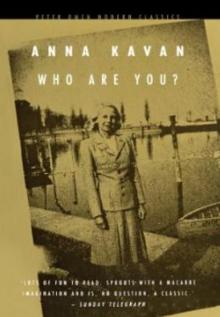 Who Are You?
Who Are You?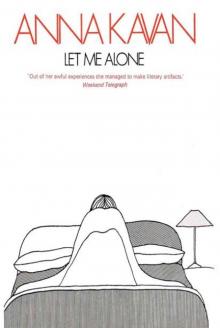 Let Me Alone
Let Me Alone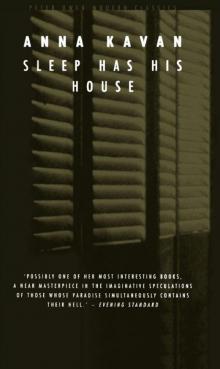 Sleep Has His House
Sleep Has His House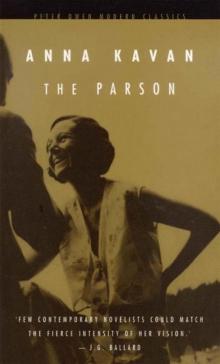 The Parson (Peter Owen Modern Classic)
The Parson (Peter Owen Modern Classic)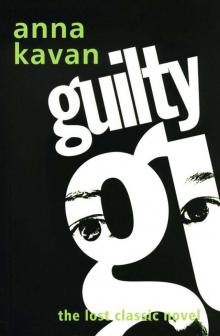 Guilty: The Lost Classic Novel
Guilty: The Lost Classic Novel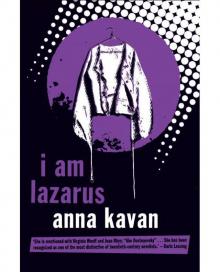 I Am Lazarus (Peter Owen Modern Classic)
I Am Lazarus (Peter Owen Modern Classic)